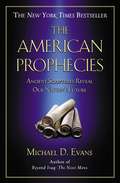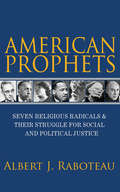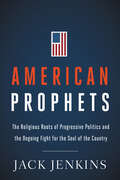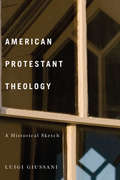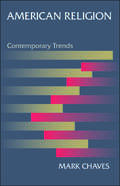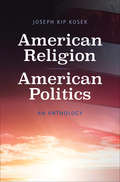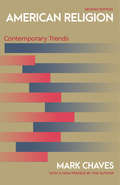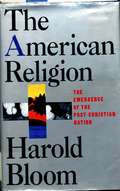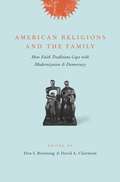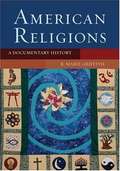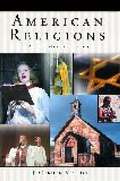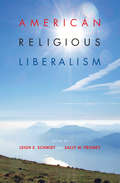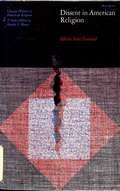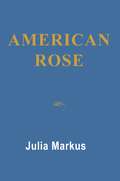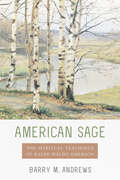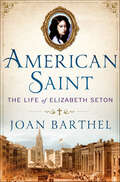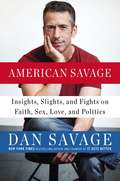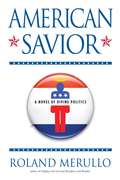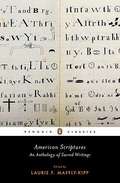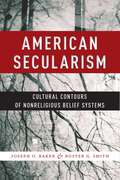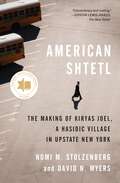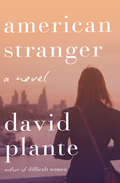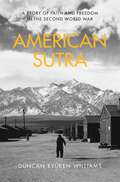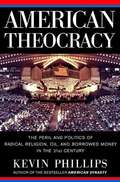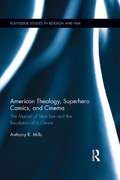- Table View
- List View
American Prophecies: Ancient Scriptures Reveal Our Nation's Future
by Michael D. EvansHow is America tied into ancient biblical prophecies? According to author Michael Evans, a fundamentalist Christian minister, biblical prophets already predicted that America is doomed to collapse unless its government stops accommodating the Arab world for the sake of oil and instead offers full military and diplomatic support to Israel. He believes that God wants Israel to have full control of the West Bank and Gaza, and Americans are risking God's wrath by not fully supporting this biblical mandate. Evans also theorizes that much of America's problems--including the attack of 9-11--are indications of God's fury over America's split allegiance between the two famous descendents of Abraham: Ishmael and Isaac. "We are caught in a tug of war between two brothers--between oil, political expedience, and conscience in many ways--and it our decisions and polices concerning these two brothers that will determine whether the United States will survive or go the way of the Roman Empire," he writes. Evans's prophetic foundation begins with the parable of the fig tree (Matthew 24:32-44), in which he interprets the various signs Jesus gave his disciples to mark "the final age and his return." Obviously, the Bible can be interpreted many ways, and Evans uses 17 chapters to weave in interpretations of scripture that support his theory that America faces a mammoth choice--ruin or salvation. Although actual quotes from scripture are rather sparse throughout the book, he concludes with a five-page index of "Ancient Prophecies" that indirectly support his theory. One caveat--Evans (Beyond Iraq) does not hide his vehement anti-Muslim leanings. This book will probably be offensive to Christians who practice religious tolerance and lean toward a more-inclusive solution to American diplomacy in the Middle East. --Gail Hudson
American Prophets: Seven Religious Radicals and Their Struggle for Social and Political Justice
by Albert J. RaboteauAmerican Prophets sheds critical new light on the lives and thought of seven major prophetic figures in twentieth-century America whose social activism was motivated by a deeply felt compassion for those suffering injustice.In this compelling and provocative book, acclaimed religious scholar Albert Raboteau tells the remarkable stories of Abraham Joshua Heschel, A. J. Muste, Dorothy Day, Howard Thurman, Thomas Merton, Martin Luther King, Jr., and Fannie Lou Hamer--inspired individuals who succeeded in conveying their vision to the broader public through writing, speaking, demonstrating, and organizing. Raboteau traces how their paths crossed and their lives intertwined, creating a network of committed activists who significantly changed the attitudes of several generations of Americans about contentious political issues such as war, racism, and poverty. Raboteau examines the influences that shaped their ideas and the surprising connections that linked them together. He discusses their theological and ethical positions, and describes the rhetorical and strategic methods these exemplars of modern prophecy used to persuade their fellow citizens to share their commitment to social change.A momentous scholarly achievement as well as a moving testimony to the human spirit, American Prophets represents a major contribution to the history of religion in American politics. This book is essential reading for anyone who is concerned about social justice, or who wants to know what prophetic thought and action can mean in today's world.
American Prophets: The Religious Roots of Progressive Politics and the Ongoing Fight for the Soul of the Country
by Jack Jenkins“[A] thoroughly reported [and] revelatory history about the intersection of progressive politics and religion in America” (Publishers Weekly).Since the 1970s, the Religious Right has established itself as a coalition of fundamentalist powerbrokers who set the standard for Christian political values. But, as religion reporter Jack Jenkins contends, the country is also driven by a vibrant, long-standing moral force from the left. Taking many forms and many names, the Religious Left has operated since America’s founding—praying, and protesting for progressive values such as abolition, labor reform, civil rights, environmental preservation.In American Prophets, Jenkins examines the re-emergence of progressive faith-based activism, detailing its origins and contrasting its goals with those of the Religious Right. Today’s rapidly expanding interfaith coalition — which includes Christians, Jews, Muslims, Buddhists, and other faiths — has become a force within the larger “resistance” movement. Jenkins profiles Washington political insiders—including former White House staffers and faith outreach directors for the campaigns of Barack Obama, John Kerry, and Hillary Clinton—as well as a new generation of progressive faith leaders, including:Linda Sarsour, co-chair of the Women’s MarchRev. Traci Blackmon, a pastor near Ferguson, Missouri, who lifts up black liberation efforts across the countrySister Simone Campbell, head of the Catholic social justice lobby and the “Nuns on the Bus” tour organizerNative American “water protectors” who demonstrated against the Dakota Access Pipeline in Standing RockBishop Gene Robinson, the first openly gay Episcopal bishop
American Protestant Theology
by Luigi Giussani Damian BacichIn American Protestant Theology, Luigi Giussani traces the history of the most meaningful theological expressions and the cultural significance of American Protestantism, from its origins in seventeenth-century Puritanism to the 1950s. Giussani clarifies and assesses elements of Protestantism such as the democratic approach to Church-State relations, "The Great Awakening," Calvinism and Trinitarianism, and liberalism. His rich references and analytical descriptions reconstruct an overview of the development of a religion that has great importance in the context of spiritual life and American culture. He also displays full respect for the religious depth from which Protestantism was born and where it can reach, and expresses great admiration for its most prominent thinkers and spiritual leaders, including Jonathan Edwards, Horace Bushnell, Walter Rauschenbusch, Reinhold Niebuhr, and Paul Tillich. Further testament to Giussani's clear-minded and comprehensive knowledge of Christianity, American Protestant Theology makes the work of a master theologian available in English for the first time.
American Religion
by Mark ChavesMost Americans say they believe in God, and more than a third say they attend religious services every week. Yet studies show that people do not really go to church as often as they claim, and it is not always clear what they mean when they tell pollsters they believe in God or pray. American Religion presents the best and most up-to-date information about religious trends in the United States, in a succinct and accessible manner. This sourcebook provides essential information about key developments in American religion since 1972, and is the first major resource of its kind to appear in more than two decades. Mark Chaves looks at trends in diversity, belief, involvement, congregational life, leadership, liberal Protestant decline, and polarization. He draws on two important surveys: the General Social Survey, an ongoing survey of Americans' changing attitudes and behaviors, begun in 1972; and the National Congregations Study, a survey of American religious congregations across the religious spectrum. Chaves finds that American religious life has seen much continuity in recent decades, but also much change. He challenges the popular notion that religion is witnessing a resurgence in the United States--in fact, traditional belief and practice is either stable or declining. Chaves examines why the decline in liberal Protestant denominations has been accompanied by the spread of liberal Protestant attitudes about religious and social tolerance, how confidence in religious institutions has declined more than confidence in secular institutions, and a host of other crucial trends.
American Religion, American Politics: An Anthology
by Jon Butler Joseph Kip KosekEssential primary sources reveal the central tensions between American politics and religion throughout the nation’s history Despite the centrality of separation of church and state in American government, religion has played an important role in the nation’s politics from colonial times through the present day. This essential anthology provides a fascinating history of religion in American politics and public life through a wide range of primary documents. It explores contentious debates over freedom, tolerance, and justice, in matters ranging from slavery to the nineteenth-century controversy over Mormon polygamy to the recent discussions concerning same-sex marriage and terrorism. Bringing together a diverse range of voices from Protestant, Catholic, Jewish, Muslim, and secular traditions and the words of historic personages, from Thomas Jefferson, Abraham Lincoln, and Frances Willard to John F. Kennedy and Martin Luther King, Jr., this collection is an invaluable introduction to one of the most important conversations in America’s history.
American Religion: Contemporary Trends
by Mark ChavesMost Americans say they believe in God, and more than a third say they attend religious services every week. Yet studies show that people do not really go to church as often as they claim, and it is not always clear what they mean when they tell pollsters they believe in God or pray. American Religion presents the best and most up-to-date information about religious trends in the United States, in a succinct and accessible manner. This sourcebook provides essential information about key developments in American religion since 1972, and is the first major resource of its kind to appear in more than two decades. Mark Chaves looks at trends in diversity, belief, involvement, congregational life, leadership, liberal Protestant decline, and polarization. He draws on two important surveys: the General Social Survey, an ongoing survey of Americans' changing attitudes and behaviors, begun in 1972; and the National Congregations Study, a survey of American religious congregations across the religious spectrum. Chaves finds that American religious life has seen much continuity in recent decades, but also much change. He challenges the popular notion that religion is witnessing a resurgence in the United States--in fact, traditional belief and practice is either stable or declining. Chaves examines why the decline in liberal Protestant denominations has been accompanied by the spread of liberal Protestant attitudes about religious and social tolerance, how confidence in religious institutions has declined more than confidence in secular institutions, and a host of other crucial trends. Now with updated data and a new preface by the author, this revised edition provides essential information about key developments in American religion since 1972, plainly showing that religiosity is declining in America.
American Religion: The Emergence of the Postchristian Nation
by Harold BloomHow America has developed unique religious groups.
American Religions and the Family: How Faith Traditions Cope with Modernization and Democracy
by David A. Clairmont Don S. Browning Eds.Religions respond to capitalism, democracy, industrialization, feminism, individualism, and the phenomenon of globalization in a variety of ways. Some religions conform to these challenges, if not capitulate to them; some critique or resist them, and some work to transform the modern societies they inhabit. <P><P>In this unique collection of critical essays, scholars of Judaism, Christianity, Islam, Hinduism, Buddhism, Confucianism, and Native American thought explore the tension between modernization and the family, sexuality, and marriage traditions of major religions in America. Contributors examine how various belief systems have confronted changing attitudes regarding the meaning and purpose of sex, the definition of marriage, the responsibility of fathers, and the status of children. They also discuss how family law in America is beginning to acknowledge certain religious traditions and how comparative religious ethics can explain and evaluate diverse family customs.Studies concerning the impact of religious thought and behavior on American society have never been more timely or important. Recent global events cannot be fully understood without comprehending how belief systems function and the many ways they can be employed to the benefit and detriment of societies. Responding to this critical need, American Religions and the Family presents a comprehensive portrait of religious cultures in America and offers secular society a pathway for appreciating religious tradition.
American Religions: A Documentary History
by R. Marie GriffithReligion has played a complex, vibrant, and multifaceted role in our nation's history. One of the most effective ways to help students explore its vitality is through primary sources. American Religions: A Documentary History is the only one-volume, up-to-date collection of primary sources available for American religious history courses. Featuring a creative dual structure--the readings are arranged both chronologically and thematically--this indispensable sourcebook can be used in both historically and topically organized courses. Balancing canonical works with those by newly discovered voices, American Religions: A Documentary History includes seventy-five classic and contemporary selections from the colonial period through the present day. It offers readings by a uniquely wide range of religiously, socially, and ethnically diverse writers: theological conservatives and liberals, northerners and southerners, women and men, and African Americans and Mexican Americans alongside Anglo-Americans. The selections are long enough to stimulate serious discussion yet concise enough for students to digest easily. The volume is organized into six sections that cover different chronological periods, each of which contains writings on five themes: theological reflections, ritual and performance, spiritual autobiography, interreligious conflict and negotiation, and more expansive conceptualizations of religion. Enhanced by brief biographies of the authors, a general introduction, and section introductions, the text also includes two sample syllabi--one oriented toward a historical approach and the other toward a thematic approach. Ideal for introductory courses in religion in America and American religious history--taught both in religious studies and history departments--American Religions: A Documentary History offers students a broad yet in-depth and engaging gateway into the subject.
American Religions: An Illustrated History
by J. Gordon MeltonMelton (Institute for the Study of American Religion, Santa Barbara, California) begins with over 400 native religions being practiced at the time of European contact. He then discusses the initial colonization and religious pioneers, how religious groups dealt with their new dependence on voluntary member support and the forces leading to the Civil War, the emergence of fundamentalism and its development up to current controversies, and the leap in religious pluralism at the end of the 20th century.
American Religious Liberalism (Religion in North America)
by Leigh E. Schmidt and Sally M. PromeyAn enlightening look at the surprising connections between spirituality and progressive thought in the United States. Religious liberalism in America is often associated with an ecumenical Protestant establishment. This book, however, draws attention to the broad diversity of liberal cultures that shapes America&’s religious movements. The essays gathered here push beyond familiar tropes and boundaries to interrogate religious liberalism&’s dense cultural leanings by looking at spirituality in the arts, the politics and piety of religious cosmopolitanism, and the interaction between liberal religion and liberal secularism. Readers will find a kaleidoscopic view of many of the progressive strands of America&’s religious past and present in this richly provocative volume.
American Religious Thought
by William A. ClebschThis book presents the broad current of religious dissent as a pervasive, although often hidden and ignored, stream in American life.
American Rose
by Julia MarkusA moving epic novel about the Addis family follows the lives of a butcher, Charles, and his wife Etta, their two children, and Rose, the grandchild who must face the demands of their past.ROSE WAS BORN TO A FAMILY OF EXTRAORDINARY WOMEN.Her immigrant great-grandmother, the first Rose, a shrewd and beautiful fortune-teller, who gave abortions to make "a little extra"...Proud Etta, matriarch, lover of costly things, who kept a fine home with a firm hand...Delicate Helen, musical prodigy, who soared on her talent into madness.Now Rose-American Rose-must face up to all their lives in order to claim her own.Julia Markus, an English professor at Hofstra University, received the Houghton Mifflin Literary Award for her first novel, Uncle, which was followed by three well-received novels, American Rose, Friends Along the Way and A Change of Luck, as well as her critically acclaimed biographies, Dared and Done: The Marriage of Elizabeth Barrett and Robert Browning and Across An Untried Sea: Discovering Lives Hidden in the Shadow of Convention and Time. She has won a National Endowment for the Arts grant and two National Endowment for the Humanities grants. Her most recent book is J. Anthony Froude: The Last Undiscovered Great Victorian."Bickering, weeping, sulking, giggling-the Addises are vibrantly alive. Their struggles both distress and amuse us; their disappointments touch us..."--Anne Tyler, The New York Times"Moving and masterful...a novel of tremendous power and originality by one of the most gifted novelists of her generation."--Pat Conroy, author of The Prince of Tides"A story told by a writer who knows her people from the heart out...I loved it!"--Belva Plain, author of Evergreen and Random Winds
American Sage: The Spiritual Teachings of Ralph Waldo Emerson
by Barry M. Andrews&“Succeeds in making Emerson&’s ideas and recommended spiritual practices accessible. . . . [For] those interested in nineteenth-century American spiritualism.&” —Publishers Weekly Even during his lifetime, Ralph Waldo Emerson was called the Sage of Concord, a fitting title for this leader of the American Transcendentalist movement. Everything that Emerson said and wrote directly addressed the conduct of life, and in his view, spiritual truth and understanding were the essence of religion. Unsurprisingly, he sought to rescue spirituality from decay, eschewing dry preaching and rote rituals. Unitarian minister Barry M. Andrews has spent years studying Emerson, finding wisdom and guidance in his teachings and practices, and witnessing how the spiritual lives of others are enriched when they grasp the many meanings in his work. In American Sage, Andrews explores Emerson's writings, including his journals and letters, and makes them accessible to today's spiritual seekers. Written in everyday language and based on scholarship grounded in historical detail, this enlightening book considers the nineteenth-century religious and intellectual crosscurrents that shaped Emerson's worldview to reveal how his spiritual teachings remain timeless and modern, universal and uniquely American. &“An ideal companion for readers working through Emerson's essays, a reading group on spirituality, and any number of classroom situations.&” —David M. Robinson, author of Emerson and the Conduct of Life: Pragmatism and Ethical Purpose in the Later Work &“In a style that is both scholarly and highly readable, Andrews offers an insightful account of Emerson's teachings. . . . demonstrating how his ideas are relevant to readers of today who are poised between faith and unbelief.&” —Phyllis Cole, author of Mary Moody Emerson and the Origins of Transcendentalism: A Family History
American Saint: The Life of Elizabeth Seton
by Joan Barthel“A fascinating biography” of Elizabeth Seton, who shocked high society by converting to Catholicism—a faith that was illegal in New York when she was born (Booklist).In this riveting biography of the first American saint, Joan Barthel tells the mesmerizing story of a woman whose life encompassed wealth and poverty, passion and sorrow, love and loss. Elizabeth was born into a prominent New York City family in 1774—when Catholicism was illegal and priests in the city were arrested, and sometimes hanged. Her father was the chief health officer for the Port of New York, and she lived down the block from Alexander Hamilton. She danced at George Washington’s sixty-fifth Birthday Ball in cream slippers, monogrammed. When Elizabeth and her husband sailed to Italy in a doomed attempt to cure his tuberculosis, she and her family were quarantined in a damp dungeon. And when, after she was widowed, Elizabeth became a Catholic, she was so scorned that people talked of burning down her house. American Saint is the inspiring story of a brave woman who forged the way for other women who followed and who made a name for herself in a world entirely ruled by men. Founder of the Sisters of Charity, she resisted male clerical control of her religious order—and she also started America’s first Catholic school, laying the foundation of an educational system that would help countless children thrive in a new nation.“Compelling . . . an exquisite story of Seton’s inspiring life. . . . Readers interested in Catholic history and U.S. history should not overlook this important biography.” —Publishers Weekly“Barthel is a fine and insightful observer of this larger-than-life woman who was so far ahead two hundred years ago that we’re still catching up with her.” —Gloria SteinemIncludes a foreword by Maya Angelou
American Savage: Insights, Slights, and Fights on Faith, Sex, Love, and Politics
by Dan SavageOn the heels of his Emmy-winning It Gets Better campaign, columnist and provocateur Dan Savage weighs in on such diverse issues as healthcare, gun control, and marriage equality with characteristic straight talk and humor. <P> Dan Savage has always had a loyal audience, thanks to his syndicated sex-advice column "Savage Love," but since the incredible global success of his It Gets Better project-his book of the same name was a New York Times bestseller-his profile has skyrocketed. In addition, he's written for The New York Times, Rolling Stone, The Onion, GQ, The Guardian, Salon. com, and countless other widely read publications. Savage is recognized as someone whose opinions about our culture, politics, and society should not only be listened to but taken seriously. <P> Now, in American Savage, he writes on topics ranging from marriage, parenting, and the gay agenda to the Catholic Church and sex education. .
American Savior: A Novel of Divine Politics
by Roland Merullo[Book Jacket] Roland Merullo's novel American Savior posits an inspired "what if" scenario: What if Jesus, alarmed at how the earth's most powerful nation has lost its spiritual footing and dismayed at how His own teachings have been distorted--used by politicians and religious zealots to turn love into hatred and faith into a call to arms-- returns and announces that he is running for President of the United States? What if He becomes a third-party candidate, is heralded as the Son of God, and not only threatens to disrupt the status quo but poses a serious threat to the already established Democratic and Republican candidates? What would happen? How would the media react? And, more important, how would we react? Narrated by a more than slightly cynical young TV reporter, American Savior puts the reader inside the campaign waged by what is quickly dubbed the Divinity Party and follows Jesus and his modern-day disciples as they travel across the nation making speeches, reaching out to the people, and in the process arousing the ire of those who believe they know God, and who know, most assuredly, that this is not He.
American Scriptures
by Laurie F. Maffly-KippA groundbreaking collection of sacred Christian writings of American origin from Mormons, Shakers, Christian Scientists, and others. "Scripture" is any work in which the authors, translators, editors, or discoverers all claim to have received wisdom from a source outside themselves, be it revelation, enlightened philosophy, or ancient archive. For the first time in a single volume, American Scriptures gathers fifteen of these texts from religious movements with origins in the United States. Laurie F. Maffly-Kipp's concise single volume will enlighten not only readers interested in the historical and religious aspects of the scriptural texts, but also those whose interest has been piqued by such bestsellers as Angels and Demons and The Da Vinci Code.
American Secularism: Cultural Contours of Nonreligious Belief Systems (Religion and Social Transformation #3)
by Joseph O. Baker Buster G. SmithHonorable Mention, American Sociological Association Section on Religion Distinguished Book AwardA rapidly growing number of Americans are embracing life outside the bounds of organized religion. Although America has long been viewed as a fervently religious Christian nation, survey data shows that more and more Americans are identifying as “not religious.” There are more non-religious Americans than ever before, yet social scientists have not adequately studied or typologized secularities, and the lived reality of secular individuals in America has not been astutely analyzed. American Secularism documents how changes to American society have fueled these shifts in the non-religious landscape and examines the diverse and dynamic world of secular Americans.This volume offers a theoretical framework for understanding secularisms. It explores secular Americans’ thought and practice to understand secularisms as worldviews in their own right, not just as negations of religion. Drawing on empirical data, the authors examine how people live secular lives and make meaning outside of organized religion. Joseph O. Baker and Buster G. Smith link secularities to broader issues of social power and organization, providing an empirical and cultural perspective on the secular landscape. In so doing, they demonstrate that shifts in American secularism are reflective of changes in the political meanings of “religion” in American culture.American Secularism addresses the contemporary lived reality of secular individuals, outlining forms of secular identity and showing their connection to patterns of family formation, sexuality, and politics, providing scholars of religion with a more comprehensive understanding of worldviews that do not include traditional religion. Data Analyses Appendix
American Shtetl: The Making of Kiryas Joel, a Hasidic Village in Upstate New York
by David N. Myers Nomi M. StolzenbergA compelling account of how a group of Hasidic Jews established its own local government on American soilSettled in the mid-1970s by a small contingent of Hasidic families, Kiryas Joel is an American town with few parallels in Jewish history—but many precedents among religious communities in the United States. This book tells the story of how this group of pious, Yiddish-speaking Jews has grown to become a thriving insular enclave and a powerful local government in upstate New York. While rejecting the norms of mainstream American society, Kiryas Joel has been stunningly successful in creating a world apart by using the very instruments of secular political and legal power that it disavows.Nomi Stolzenberg and David Myers paint a richly textured portrait of daily life in Kiryas Joel, exploring the community's guiding religious, social, and economic norms. They delve into the roots of Satmar Hasidism and its charismatic founder, Rebbe Joel Teitelbaum, following his journey from nineteenth-century Hungary to post–World War II Brooklyn, where he dreamed of founding an ideal Jewish town modeled on the shtetls of eastern Europe. Stolzenberg and Myers chart the rise of Kiryas Joel as an official municipality with its own elected local government. They show how constant legal and political battles defined and even bolstered the community, whose very success has coincided with the rise of political conservatism and multiculturalism in American society over the past forty years.Timely and accessible, American Shtetl unravels the strands of cultural and legal conflict that gave rise to one of the most vibrant religious communities in America, and reveals a way of life shaped by both self-segregation and unwitting assimilation.
American Stranger: A Novel
by David PlanteA daughter of Jewish refugees searches for love and a spiritual home in this novel by the National Book Award–nominated author of Difficult Women. Brought up in a secular household on Manhattan&’s Upper East Side, Nancy Green knows suspiciously little about her parents&’ past. She knows they escaped Germany, avoiding the fate of so many of their fellow Jews during World War II, but the few family heirlooms they brought to the United States are reminders of a lost life that, for Nancy, remains shrouded in mystery. She seeks connection and a sense of belonging, a relationship in which she can find some sort of religious fulfillment. Unfortunately, Nancy&’s first encounter is with a Hasidic man who, dissatisfied with Judaism, has taken vows to become a monk. Then, while studying English literature in Boston, she meets a Catholic boy who captures her interest, but he&’s desperate to escape his overbearing mother and the clutches of the Church. After a devastating breakup, Nancy finally settles down with a husband whose background and beliefs seem at least similar to her own. Perhaps now she&’ll stop yearning for something more, and trade volatility and heartbreak for a sensible, practical life. But forcing a fit—into a society, a sect, a family, or even a marriage—isn&’t easy for anyone, and Nancy still has a long way to travel before she finds her true home. From an acclaimed author of both fiction and memoirs, including National Book Award finalist The Family, American Stranger is a wise and insightful story about the search for identity, and how our real lives are far more complex than our labels. &“Plante . . . is always worth reading.&” —The Washington Post
American Sutra: A Story of Faith and Freedom in the Second World War
by Duncan Ryūken WilliamsDuncan Ryūken Williams reveals the little-known story of how, in the darkest hours of World War II when Japanese Americans were stripped of their homes and imprisoned in camps, a community of Buddhists launched one of the most inspiring defenses of religious freedom in our nation’s history, insisting that they could be both Buddhist and American.
American Theocracy: The Peril and Politics of Radical Religion, Oil and Borrowed Money in the 21st Century
by Kevin PhillipsFrom America's premier political analyst, an explosvie examination of the coalition of forces that threatens the nation in this century.
American Theology, Superhero Comics, and Cinema: The Marvel of Stan Lee and the Revolution of a Genre (Routledge Studies in Religion and Film)
by Anthony MillsStan Lee, who was the head writer of Marvel Comics in the early 1960s, co-created such popular heroes as Spider-Man, Hulk, the X-Men, the Fantastic Four, Iron Man, Thor, and Daredevil. This book traces the ways in which American theologians and comic books of the era were not only both saying things about what it means to be human, but, starting with Lee they were largely saying the same things. Author Anthony R. Mills argues that the shift away from individualistic ideas of human personhood and toward relational conceptions occurring within both American theology and American superhero comics and films does not occur simply on the ontological level, but is also inherent to epistemology and ethics, reflecting the comprehensive nature of human life in terms of being, knowing, and acting. This book explores the idea of the "American monomyth" that pervades American hero stories and examines its philosophical and theological origins and specific manifestations in early American superhero comics. Surveying the anthropologies of six American theologians who argue against many of the monomyth’s assumptions, principally the staunch individualism taken to be the model of humanity, and who offer relationality as a more realistic and ethical alternative, this book offers a detailed argument for the intimate historical relationship between the now disparate fields of comic book/superhero film creation, on the one hand, and Christian theology, on the other, in the United States. An understanding of the early connections between theology and American conceptions of heroism helps to further make sense of their contemporary parallels, wherein superhero stories and theology are not strictly separate phenomena but have shared origins and concerns.
